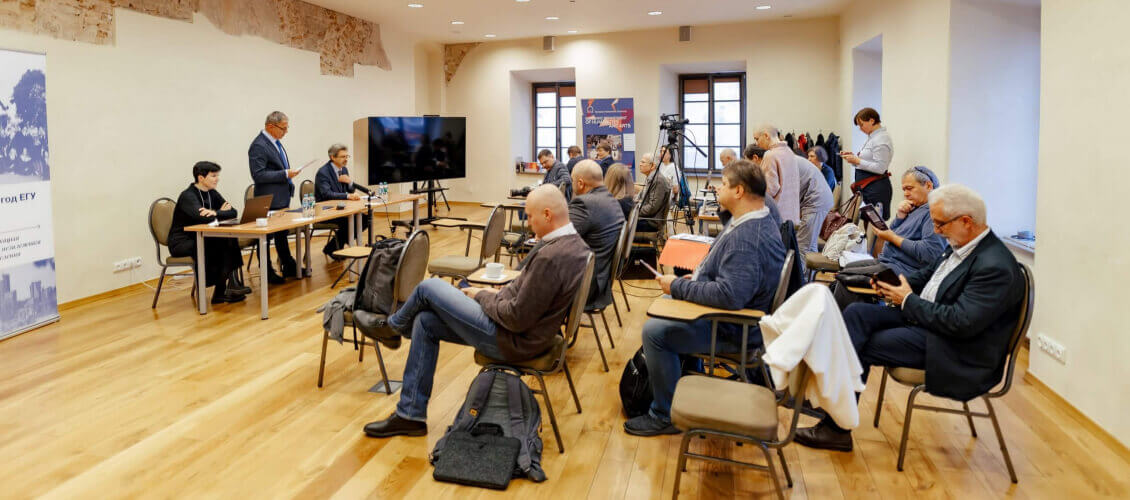Leading historians from Lithuania, Poland, the Czech Republic and Germany took part in the discussion of studies presented by Belarusian scholars.
The program of the conference, organized by the Center for Belarus and Regional Studies (CBRS) of the EHU Academic Department of Humanities and Arts, included eight thematic panels on various aspects of the history of the Grand Duchy of Lithuania: the formation of written culture and printing, the situation of religious communities and the ethno-linguistic situation, social structure and political and legal system, foreign policy and the struggle for sovereignty.
Opening the conference, EHU Rector Prof. Dr. Sergey Ignatov addressed the audience with a welcoming speech in which, in particular, he emphasized the importance of the event not only for the understanding of historical experience, but also the modern context:
“Just as during the period of the existence of the Grand Duchy of Lithuania which was a multiethnic state with a diversity of languages, beliefs and cultures, so today our students and staff from Belarus, Russia, Moldova, Kazakhstan, Georgia, Lithuania, Ukraine and representatives of other countries find a common language together at our university. It is very important to mention that here we value diversity of opinions, critical thinking, initiatives and creativity the most. People from different countries study and work at this university, representing different cultures and viewpoints, so tolerance and respect are the basis of our organization.”
The head of the CBRS, Ph.D. in History, Prof. Iryna Ramanava, also addressed the participants and guests of the conference with an opening speech, noting the particular importance of scientific knowledge in the fight against the ideologization of history:
“It is obvious to everyone today that history has become the most powerful weapon. It is in it that ideologists look for and find justifications for any violence. And our task as a professional community is to resist this.”
The plenary session included a report on “The Grand Duchy of Lithuania at the Turn of the Fifteenth and Sixteenth Centuries. The Birth of a New Type of Personality” presented by Prof. Dr. habil. Alexander Grusha. The scholar, using the examples of the scribe Matthew Ivanovich “the Tenth”, Prince Fyodor Ivanovich Yaroslavich, translator and publisher of books of Holy Scripture Francysk Skaryna, revealed the problems of individual choice in terms of social and family traditions of the time.
Speaking about the importance of historical research in the modern context of the preservation of the Belarusian identity, the presenter noted:
“The topic concerning the identity of the Middle Ages is not actively and widely discussed today in the leading centers for the study of the Middle Ages. But it is extremely topical for the critically thinking part of contemporary society of Belarus, which since 2020, among other things, is trying to preserve its personal identity.”
The first day of the conference ended with a presentation of the film “Skaryna’s Garden”, created by EHU lecturers Aliaksandr Matafonau and Siarhej Chareuski for the 500th anniversary of the publication in Vilnius of the first printed book in the entire territory of the Grand Duchy of Lithuania by the Belarusian humanist and enlightener Francysk Skaryna.
The working program of the second day of the conference opened with the discussion “Statehood and Nation-Building in Early Modern Eastern Europe in the Perspective of the 21st Century”. The discussion, moderated by Prof. Dr. Jan Kusber (Johannes Gutenberg University of Mainz, Germany), was attended by:
- Dr Hienadź Sahanovič (Berlin Institute for Advanced Study, Germany);
- Dr. Mathias Niendorf (Historical Institute of the University of Greifswald, Germany);
- Dr. Alvydas Nikžentaitis (Lithuanian Institute of History);
- Dr. Hans-Jürgen Bömelburg (Justus Liebig University of Giessen, Germany);
- D. in History Andrei Doronin (German Historical Institute, University of Bonn);
- Prof. Dr. Stefan Rohdewald (Leipzig University, Germany).
